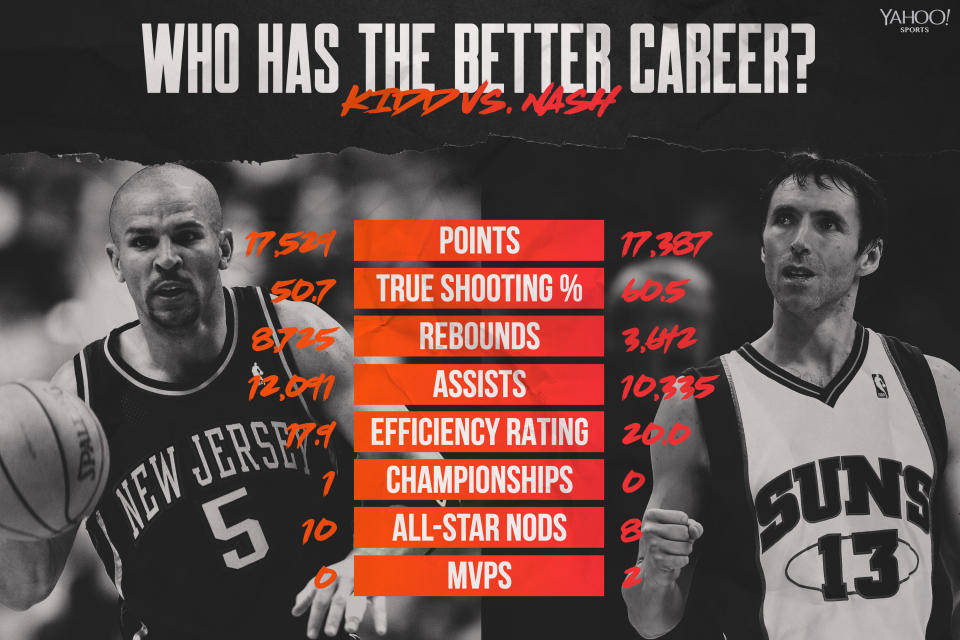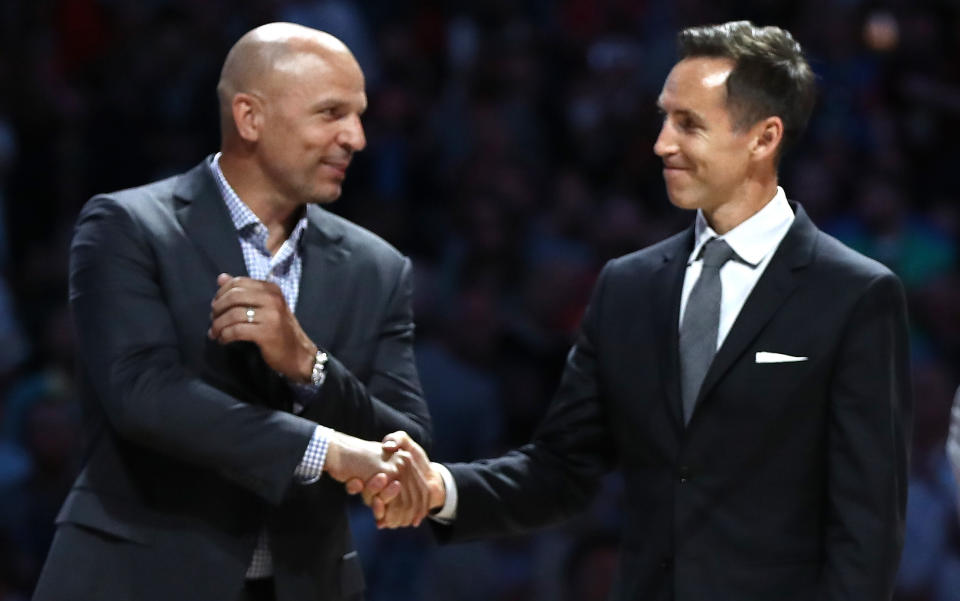Whose NBA career is better? Jason Kidd vs. Steve Nash
Victors are determined decisively on the court, but one great joy of fandom outside the lines has no clear winner. We love to weigh the merits of our favorite players against each other, and yet a taproom full of basketball fans can never unanimously agree on the GOAT. In this series, we attempt to settle scores of NBA undercard debates — or at least give you fodder for your next “Who is better?” argument.
[Previously: Dwyane Wade vs. Dirk Nowitzki • Carmelo Anthony vs. Vince Carter • Kobe Bryant vs. Tim Duncan • Chris Paul vs. Isiah Thomas • Pau Gasol vs. Manu Ginobili • Patrick Ewing vs. David Robinson • Shaquille O’Neal vs. Hakeem Olajuwon • Larry Bird vs. Magic Johnson • Wilt Chamberlain vs. Bill Russell]
THE MATCHUP: Jason Kidd vs. Steve Nash
Prime numbers
Jason Kidd and Grant Hill were named co-Rookies of the Year in 1995, and Kidd stewarded the Dallas Mavericks on their 2011 title run. He made his first All-Star Game in 1996 and his last in 2010, which would trim his prime by two seasons, but why haggle when Kidd was an impact player on the national stage for 17 years.
During that span, Kidd averaged 13.2 points (40.1 FG%, 34.8 3P%, 78.4 FT%), 9.1 assists, 6.5 rebounds and two steals in 36.9 minutes per game. His teams failed to make the playoffs in his first two seasons, and then made 17 straight appearances (15 in his prime). Kidd won the 2011 title and led the Brooklyn Nets to back-to-back Finals in 2002 and 2003, losing to the Los Angeles Lakers and San Antonio Spurs.
Kidd made either the first or second teams for All-NBA and All-Defensive every year from 1999-2004. During that span, he placed in the top 10 for MVP every year but 2000, when he finished 11th, peaking in 2002 with a runner-up finish behind Tim Duncan in one of the closest (and most combative) MVP races in league history.
Nash backed up Kidd for much of his first two seasons on the Phoenix Suns, before being traded to Dallas, where he assumed Kidd’s old post — until Kidd was traded to New Jersey in 2001 and Nash rejoined the Suns three years later. This is more confusing than it needs to be. Nash first became a full-time starter for the Mavs in 2000 and made eight All-Star appearances over the next 12 seasons. We could quibble over his prime, too, but let’s just leave it at those dozen years.
In that span, Nash averaged 16.3 points (49.8 FG%, 43.2 3P%, 90.8 FT%), 9.9 assists, 3.3 rebounds and less than one steal in 33.9 minutes per game. His teams made the playoffs in nine of those 12 seasons, missing the cut in three of his final four years in Phoenix. He made four trips to the Western Conference finals — one with Dallas and three with Phoenix — and never emerged, losing twice to Tim Duncan’s Spurs, once to Dirk Nowitzki’s Mavs and once to Kobe Bryant’s Lakers.
Nash appeared on either the first or second All-NBA teams five times from 2005-10, never crossing paths with Kidd in that regard at their six-year peaks. He of course won back-to-back MVP awards in 2005 and 2006 (the first of which was even closer and more combative). He also finished runner-up to Nowitzki in 2007 and garnered three more top-10 finishes thereafter (plus an 11th-place finish in 2003).
Statistically, you might take Nash’s six-year peak over Kidd’s, especially in terms of scoring efficiency — and we will get to their absolute apexes — but that ignores Kidd’s longevity and impact defensively. If you were to take one prime over the other, though, you would probably pick the guy who extended his impact for an additional five years and made six more playoff appearances during his run, even knowing the East/West conference discrepancy might have made that a bit closer.
Advantage: Kidd

Career high
It’s hard to pick between Nash’s top three seasons. It may seem strange to suggest that the only year of that run in which he did not win MVP and did not reach the conference finals was his apex, but that is precisely what I’m about to argue here.
In 2006-07, Nash averaged 18.6 points on an NBA-best 63.1 effective field goal percentage (53/46/90 shooting splits), adding a career- and league-high 11.6 assists per game. His seven-seconds-or-less Suns scored an NBA-high 112.9 points per 100 possessions and finished 61-21, capturing the second seed. After two straight MVPs, Nash finished runner-up to Nowitzki in a somewhat close vote.
In the playoffs, Nash’s averages jumped to 18.9 points (on 46/49/89 splits) and 13.3 assists in 37.5 minutes per game. Phoenix easily disposed of Kobe’s Lakers in the opening round and pushed Duncan’s Spurs to 2-2 in the second round before the controversial suspensions of Amar’e Stoudemire and Boris Diaw derailed the series.
Never forget it was Robert Horry’s hockey-style check of Nash that drew both players off the bench in the final minute of a victory on San Antonio’s home floor. Stoudemire and Diaw almost surely would have swung Game 5 in the Suns’ favor. As it were, Nash posted 19 points and 12 assists in an 88-85 loss in Phoenix. We would remember Nash’s legacy differently had the Suns survived a Game 7 against San Antonio and breezed through the next two rounds to a title, as the Spurs did.
Kidd peaked in 2002, when he was runner-up to Duncan in the MVP race and led the Nets to the franchise’s first Finals, although he was arguably better statistically the following season, when he finished ninth in the voting and came within two wins of being the best player on a title team. Again, we’re picking nits of greatness here.
In 2001-02, Kidd averaged 14.7 points (39/32/81 splits), 9.9 assists, 7.3 rebounds and 2.1 steals in 37.3 minutes a night over a full 82-game season. He earned First Team All-NBA and First Team All-Defensive honors in his first season for the Nets, transforming a 26-win team into a 52-win outfit that captured the East’s top seed.
In the playoffs, Kidd posted a 20-9-8 line on 42/19/81 splits. After avoiding disaster in a best-of-five first-round series with the Indiana Pacers that went the distance, his Nets breezed through to the Finals against a historically weak Eastern Conference, before getting swept by a Shaq-and-Kobe Lakers team seeking its three-peat.
It’s just as easy to imagine those Nets failing to reach a conference finals in a loaded West as it is to picture Nash’s Suns easily making the Finals in the watered-down East. This is much easier to parcel out if we look at their peaks side-by-side:
Nash: three years, 18-4-11 on 52/44/90 splits, two MVPs and one MVP runner-up
Kidd: two years, 17-7-9 on 40/33/83 splits and one MVP runner-up
Now, this probably just comes down to preference. Do you like the offensive dynamo? Or the triple-double threat who impacts the game on both ends of the court? I’ll take the guy who expertly spaced the floor as a 50-40-90 shooter and made the best use of that space, averaging 17 assists per 100 possessions at the height of his career and shepherding one of the great offenses in NBA history.
Advantage: Nash
Clutch gene
There is plenty of statistical analysis outlining how both Nash and Kidd are clutch performers — the former as a skilled surgeon and the latter as a savvy brute. There are also plenty of YouTube clips of their clutch performances late in playoff games.
Nash’s playoff averages in his prime are all comparable to his regular-season numbers, if not better: 18.4 points (47.5 FG%, 41.3 3P%, 90.4 FT%), 9.5 assists and 3.1 rebounds in 37.8 minutes over 110 games. He finished 11-9 in 20 playoff series in that span, exiting in the first round just twice and losing only to Duncan’s Spurs (five times!), Chris Webber’s Kings (twice), Kobe’s Lakers and Dirk’s Mavs.
Nash finished 5-0 in advance-or-go-home games during his career — four Game 7s and a first-round Game 5 against the Utah Jazz in 2001. His averages in those games: 18 points (49.3 FG%, 40 3P%, 80 FT%), 9.4 assists (against 3.4 turnovers) and 5.2 rebounds in 40.2 minutes per game. He did lose three series-swinging Game 5s in his best chances to reach an NBA Finals, averaging 22.7 points (41.1 FG%, 31.6 3P%, 88.9 FT%), 11.3 assists and 3.7 rebounds in 40 minutes.
Kidd’s playoff averages in his prime are also similar to his regular-season numbers: 14 points (39.6 FG%, 32.5 3P%, 77.7 FT%), 8.6 assists, seven rebounds and two steals in 40.1 minutes over 142 games. He finished 15-14 in 29 playoff series in that span, including seven first-round exits, losing to Duncan’s Spurs (thrice), Shaq’s Lakers (twice) and Heat (twice), Webber’s Kings, LeBron James’ Cavaliers, Chris Paul’s Hornets, Carmelo Anthony’s Nuggets, Damon Stoudamire’s Blazers, Gary Payton’s Sonics and Chauncey Billups’ Pistons. (A few head-scratchers there.)
Kidd finished 1-2 in advance-or-go-home games in his career — two first-round Game 5s and a Game 7 against Detroit in 2004. His averages in those games: 16 points (39.1 FG%, 27.3 3P%, 100 FT%), seven rebounds, seven assists (against 2.7 turnovers) and 2.3 steals in 46 minutes. In the lone Game 7, he finished scoreless on eight shot attempts over 42 minutes opposite Billups (game-high 22 points).
At the end of a game, as in any situation, I think you would bank more on Nash’s ability to create for himself than you would Kidd’s savvy. It came down to that once:
Advantage: Nash
Hardware
• Kidd: 2011 champion; 10-time All-Star; six-time All-NBA selection (5x First Team, 1x Second Team); nine-time All-Defensive selection (4x First Team, 5x Second Team); 1995 Co-Rookie of the Year; five-time assists leader; two-time Olympic gold medalist (2000, 2008); 2007 USA Basketball Male Athlete of the Year
• Nash: two-time Most Valuable Player (2005, 2006); eight-time All-Star; seven-time All-NBA selection (3x First Team, 2x Second Team, 2x Third Team); five-time assists leader; four-time 50-40-90 club member
Nash has many career regrets. He wishes he shot more. He wishes he had more time with Dirk. He wishes the Suns core stuck together longer, too. And he wishes he had just one more chance. Any and all of those may have led to a title, but he fell short — a “disappointment” he has lamented as “not fun” while finding some solace in the realization that it often “comes down to luck, who gets the bounces.”
Nash himself has conceded that he would have traded his MVPs for a ring, and I think that’s right. I think you would take Kidd’s accolades along with the one title.
Advantage: Kidd

For the culture
Kidd has never covered himself in glory off the court. He pled guilty to spousal abuse in 2001 and driving drunk in 2013. He feuded with teammates and coaches as a player, earning three trades during his prime. And when he turned to coaching after his playing career, the feuds continued, including awkward exits in Brooklyn and Milwaukee. Maybe things will be different as an assistant coach on the Lakers.
Meanwhile, Nash established himself as a beloved ambassador for both basketball and soccer (he is now a soccer analyst for Turner Sports), even once making his way onto Time magazine’s list of the 100 most influential people. His charitable foundation was recognized with the Steve Patterson Award for Excellence in Sports Philanthropy. Nash has also successfully dabbled in filmmaking and stood up for human rights. Oh, and he lit the torch for Canada at the 2010 Vancouver Olympics.
This one isn’t all that close.
Advantage: Nash
THE DAGGER: Steve Nash is better.
If you have an idea for a matchup you would like to see in this series, let us know.
– – – – – – –
Ben Rohrbach is a staff writer for Yahoo Sports. Have a tip? Email him at rohrbach_ben@yahoo.com or follow him on Twitter! Follow @brohrbach
More from Yahoo Sports:


